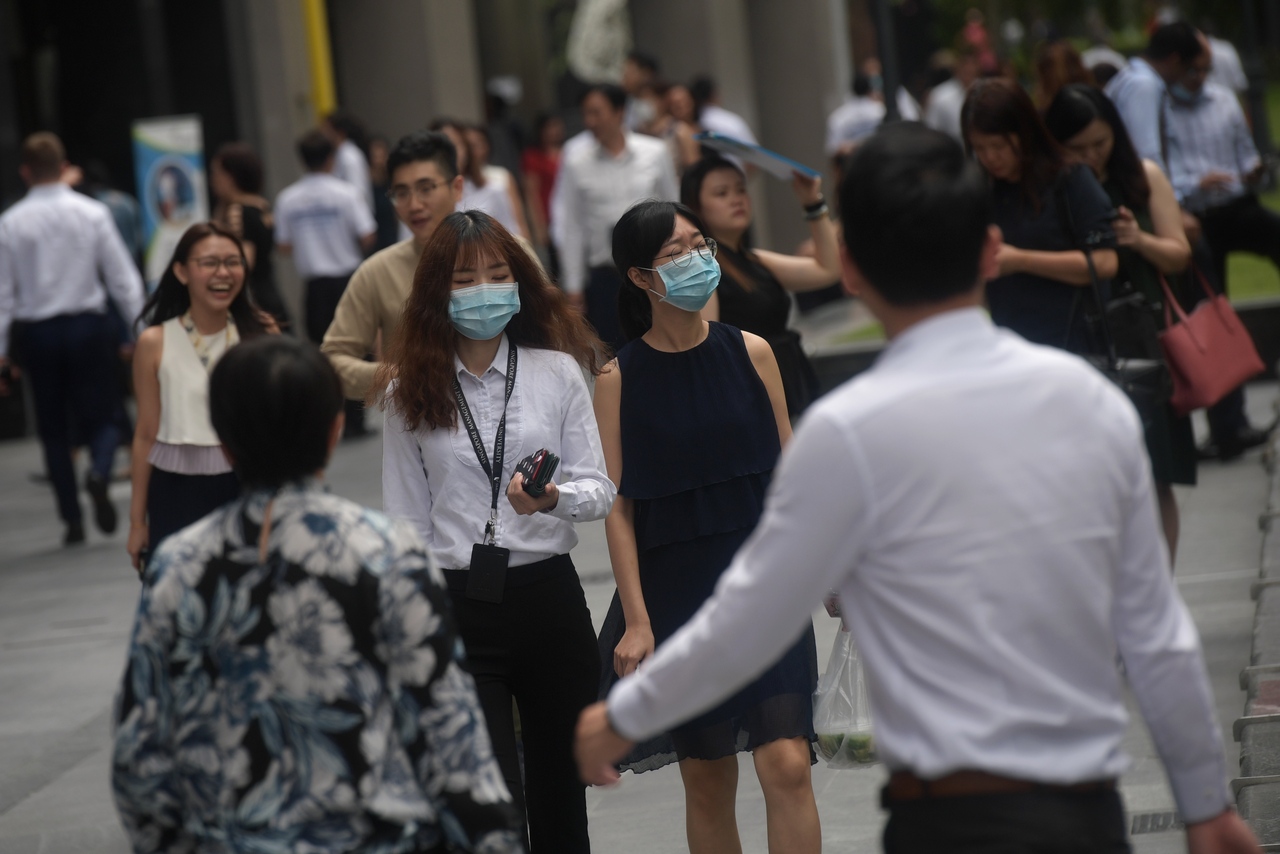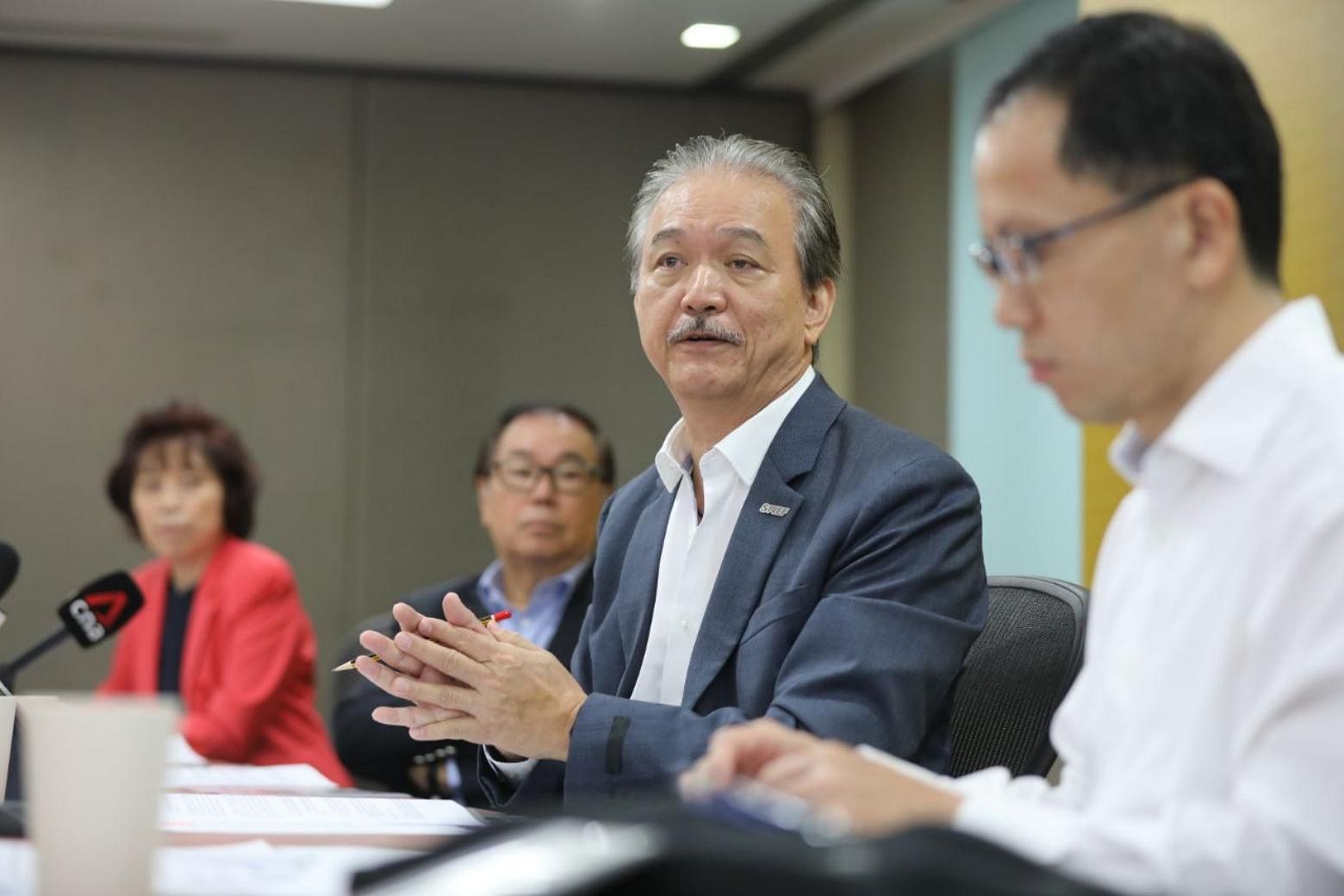Firms hit by Covid-19 should take other measures before resorting to pay cuts, retrenchments: National Wages Council
Sign up now: Get ST's newsletters delivered to your inbox

The National Wages Council said retrenchment should be a last resort, and employers doing so should ensure they conduct the exercise fairly.
ST PHOTO: KUA CHEE SIONG
SINGAPORE - Employers affected by the Covid-19 pandemic should first reduce non-wage costs and tap Government support, while pressing on with business and workforce transformation.
Only those who need to should turn to trimming wage bills, said the National Wages Council on Monday (March 30), in releasing its annual guidelines.
Retrenchment should be a last resort, said the council, and employers doing so should ensure they conduct the exercise fairly and in accordance with the tripartite advisory on managing excess manpower and responsible retrenchment which was updated earlier this month.
The council's guidelines, made ahead of the usual schedule this year, come as unemployment is expected to rise as Singapore heads into a recession this year.
The tripartite council noted that employers should support local staff who want to take on a second job to supplement their income if they have been affected by measures such as reduced working hours or temporary layoffs due
Such workers could be looking for a part-time or temporary job with other companies, said the council, which comprises representatives from employers, unions and the Government.
Council member Aubeck Kam, who is Permanent Secretary for Manpower, said during a press conference that workers may not be able to take on secondary work under their employment contracts, because during normal times employers may feel they need to concentrate on their full time job. But during this period, employers should be "encouraging and facilitating them to do so" if they implement measures such as shorter work week to reduce costs.
"The NWC calls on employers, unions and workers, and the Government to stay united and work together, to mitigate the impact of Covid-19 and position Singapore for eventual recovery," it said.
For companies which have to reduce wages, management should lead by example, and they should try as far as possible to still pay the annual wage supplement, or 13-month bonus.
Special consideration should be given to low-wage workers earning a basic monthly wage of up to $1,400.

National Wages Council (NWC) holds a press conference about the new guidelines and recommendations. (From right) Ministry of Manpower permanent secretary Aubeck Kam, SNEF president Robert Yap, NWC chairman Peter Seah, and NTUC president Mary Liew. ST PHOTO: ONG WEE JIN
ST PHOTO: ONG WEE JIN
Employers should freeze their wages if a company-wide wage cut exercise is implemented, the council said. If a wage freeze or increase is planned, they should consider giving low-wage workers a built-in wage increase of up to $50.
The council also recommended giving low-wage workers who have stepped up to assist the business during this challenging time an ex-gratia payment where possible.
Its guidelines, which cover the period from April 1 this year to June 30 next year, were released ahead of schedule this year amid the worsening impact of the coronavirus outbreak on Singapore's economy and the global economy.
Last Thursday, the Ministry of Trade and Industry further downgraded Singapore's gross domestic product growth forecast for this year to between minus 4 per cent to minus 1 per cent - a full-year recession - down from minus 0.5 per cent to 1.5 per cent.
In making recommendations on fair ways to manage wage costs, the council said monthly variable components (MVC) can be adjusted if the employer cannot wait until the end of the year to adjust annual variable parts of pay.
For the nearly 90 per cent of employers which do not have an MVC system in place, they can consider treating any cut in basic wages of up to 10 per cent - or more, for management - as an MVC cut.
Employers should set clear guidelines to reverse reductions to MVC or basic salary through future wage increase or adjustments when business recovers, said the council.
Any wage cuts should be applied fairly to local and foreign employees, it added.
The council said that employers should consider the impact of any cuts to basic pay on workers with commission-based variable payments or who have been asked to go on no-pay leave, whose overall income would already be impacted.
And companies that did well last year or are still doing well should continue to reward employees with variable payments in line with the company's performance and workers' contributions.
Companies such as Singapore Airlines, Sats, Certis, BreadTalk and Singapore Press Holdings have announced pay cuts for senior management in recent weeks. Others have implemented wage freezes.
Deputy Prime Minister Heng Swee Keat also announced in his Supplementary Budget speech last week that the Prime Minister, Cabinet ministers and other political office-holders, and the President will take a three-month pay cut.
The Government has accepted the NWC recommendations. Mr Kam said that discussions on pay are ongoing between the Public Service Division and public sector unions, and they are working towards the regular timeline of announcing the decisions and mid-year annual variable components in June.
The NWC also made other recommendations on reducing non-wage costs, managing excess manpower, and pressing on with business and workforce transformation.
For example, employers can use the excess time to bring forward planned training for workers, and redesign jobs to improve productivity. They can also consider "timebanking", which is to reduce weekly working hours without adjusting wages, with the understanding from workers that they will work these extra hours in the future.
Singapore National Employers Federation president Robert Yap called on fellow bosses to look for the opportunity in the crisis.
"We should look at how we can use this opportunity to do a lot of things that we've been trying to do. For example, flexible work, productivity, innovation, how do we cut costs, how do we create that kind of habit that we work actually in a more digital manner," he said.
The council was convened earlier this month, ahead of the usual schedule which sees it making its recommendations in end-May.
Council chairman Peter Seah said the group plans to meet again later this year to address other more permanent issues that it usually works on.
Last year, it urged employers to offer staff structured training amid rising uncertainties, and to give workers a one-off payment if the company improved productivity.
It also called on companies to raise the monthly salaries of low-wage workers by between $50 and $70, and raised the salary threshold for such workers to $1,400 a month, up from $1,300 in the previous year.
Minister for Manpower Josephine Teo said in response to this year's guidelines that they outline clearly what workers should expect from their employers.
She added that the ability of the council to agree on the guidelines under a compressed timeline shows the strength of tripartism in Singapore.
"In good times, we share the gains. In times of crisis, we share the pain - each making mutual sacrifices to sustain businesses and save jobs," she said.
Mr Seah and fellow council members also highlighted the importance of tripartite cooperation.
Mr Seah, who is DBS and Singapore Airlines chairman, said that the core principle of the tripartite movement is that all parties should always act responsibly.
"So we certainly would not condone any parties from acting irresponsibly and weakening therefore this tripartite partnership and friendship," he said, when asked whether some companies might take advantage of the situation to cut costs even if they are not affected by Covid-19.
National Trades Union Congress president Mary Liew also said in response that workers are discerning and know how well the company is doing.
"I think it's important that during this time the employers step forward and also show their appreciation and work together closely with the workers and also reward them fairly and accordingly as well. And moving on when the economy turns around, they will need the workers as well to continue on with their journey."
She also called on workers to be adaptable to go for training and accept flexible work schedules or new job roles, and if necessary accept lower pay if that will help the company keep their job.
Singaporean-German Chamber of Industry and Commerce council member Alexander Melchers noted that while the over 8,000 multinational companies here may receive directives from their global headquarters elsewhere about retrenchments as the virus impact becomes more severe, the management in Singapore can tell headquarters that the approach here is different and through collaboration between the Government, company and unions, they can implement other cost-cutting measures and preserve their workforce in Singapore.


